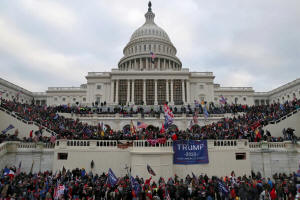Explainer: The legal questions left unanswered by Trump's impeachment
trial
 Send a link to a friend
Send a link to a friend
 [February 18, 2021]
By Jan Wolfe [February 18, 2021]
By Jan Wolfe
(Reuters) - The impeachment trial of Donald
Trump took the U.S. government into new legal territory, highlighting
unresolved questions about how to address allegations of misconduct by a
president about to leave office.
The House of Representatives voted to impeach Trump for inciting the
deadly Jan. 6 attack at the U.S. Capitol by a pro-Trump mob, but the
Senate acquitted him on Saturday by a 57-43 vote.
Here are some of the questions raised by the trial: questions that still
lack definitive answers because the U.S. Supreme Court has never had an
occasion to weigh in.
Is it legal to hold an impeachment trial for a former president?
Trump’s trial opened with a debate about a crucial question: whether the
U.S. Constitution allows a former president to face trial after he has
left office.

Trump's lawyer argued that the text and purpose of the Constitution's
impeachment clause make clear that the Senate’s power is limited to
convicting a sitting president.
The Senate voted 56-44 to proceed with the trial, effectively rejecting
that argument.
The 56 senators who voted to proceed were on solid legal footing. The
majority of legal scholars who have studied the question have concluded
that a "late impeachment" like Trump's is lawful.
These experts believe that presidents who commit misconduct late in
their terms should not be immune from the very process the Constitution
created for holding them accountable.
Ultimately, the question remains unsettled and will likely remain that
way unless the courts have an occasion to weigh in.
The Senate's vote in Trump's trial is not binding on future senators, so
the question may be revisited in a future impeachment trial, said Frank
Bowman, a law professor at the University of Missouri.
"Impeachment is a political process, not a legal one," Bowman said. "No
Congress can bind a future Congress on any of these points."
Does an impeachable offense need to be a violation of U.S. criminal law?
The Constitution provides that a president can be impeached for "high
crimes and misdemeanors.”
[to top of second column]
|

A mob of supporters of U.S. President Donald Trump storm the U.S.
Capitol Building in Washington, U.S., January 6, 2021. Picture taken
January 6, 2021. REUTERS/Leah Millis TPX IMAGES OF THE DAY

Trump's allies have argued that an impeachable offense must be a
crime under U.S. law. Trump's lawyers adopted this argument, saying
there was no impeachable offense because, in their view, Trump did
not engage in "incitement" as that term has been interpreted in
criminal prosecutions.
Scholars have repeatedly rejected this argument, Bowman said. The
history of the phrase “high crimes and misdemeanors” establishes
that it extends beyond criminal conduct, he said.
Michigan State University law professor Brian Kalt, who agrees with
Bowman's view, said Congress has not "definitively resolved" the
question and the issue will never be resolved by the U.S. Supreme
Court. The high court made clear in a 1993 case that the question is
fundamentally political, and must be resolved by the Senate, Kalt
said.
Is impeachment a viable mechanism for addressing presidential
misconduct?
The Constitution makes clear that only a simple majority of the
House is needed to impeach a president, or charge him or her with
wrongdoing. Conviction of a president, however, requires two-thirds
support of the 100-member Senate, which is currently split 50-50
along party lines in a time of intense partisanship in Washington.
Kalt said Trump's recent trial suggests the House is willing to
impeach a president of the opposite political party even though it
knows it has little chance of securing a conviction.
That raises some big-picture questions about the purpose of
impeachment, Kalt said: "What purpose does impeachment serve when
you go into it knowing you aren't going to have a conviction? What
is it we're doing here?"

Kalt said Trump's trial was, in a sense, a "public airing" of the
Democrats' case against Trump for political and historical purposes.
"Impeachment gets people's attention in a way nothing else could,"
Kalt said.
(Reporting by Jan Wolfe; Editing by Noeleen Walder and Jonathan
Oatis)
[© 2021 Thomson Reuters. All rights
reserved.] Copyright 2021 Reuters. All rights reserved. This material may not be published,
broadcast, rewritten or redistributed.
Thompson Reuters is solely responsible for this content. |